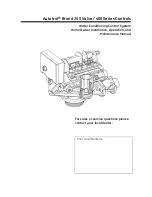
Glossary
20
Siemens Industry, Inc.
125-5065T
2012-08-06
Glossary
analog input (AI) point
Point that receives a signal that represents a
condition which has more than two states. For
example, flow rate sensors (water or air),
temperature sensors (room or duct), pressure
sensors (static or velocity), and humidity sensors
(room, duct or outdoor).
analog output (AO) point
Point that sends a signal to command equipment
which has more than two states. For example,
damper or valve positioners, fan inlet vane
controllers, motor controllers, or electric heater
controllers.
BACnet
Data communication protocol for Building
Automation and Control networks, ANSI/ASHRAE
Standard 135-1995. BACnet allows devices from
multiple manufacturers to work together.
BACnet Object Browser
An application that allows you to browse Siemens
BACnet devices and objects and third-party
BACnet devices and objects for diagnostic
purposes.
BIBB
BACnet Interoperatibility Building Blocks.
Collections of one or more BACnet services that
function to define the interoperational capabilities
of a BACnet device. For more information, see the
Building Automation and Control Networks,
ANSI/ASHRAE Standard 135-2004.
change-of-value (COV)
Point trending method where each change in a
point's value, based on a pre-defined limit, is
recorded.
digital input (DI) point
Point that receives a two-state signal such as
ON/OFF and OPEN/CLOSE. For example, low
temperature detectors, differential pressure
switches, flow proof switches, and door closures.
digital output (DO) point
Point that sends a two-state signal such as
ON/OFF and OPEN/CLOSE. For example, two-
speed fan motor starters, two-position valves and
dampers, pump motor starters, lighting switches,
and chiller and boiler switches.
HAND-OFF-AUTO (HOA) switches
Manually operated control switches located on the
face of HOA equipped MECs and point expansion
modules that enable digital output points to be
manually placed into HAND (ON), OFF, or AUTO
control. Analog outputs can be placed into AUTO
and nine manual control positions.
light emitting diode
(1) Solid state device that gives off light when
electricity passes through it. (2) Display
applications are classified either as low information
content (where a limited amount of information is
being displayed, refresh rates are slow, and the
nature of information being displayed is
predictable), or as high information content (where
the opposite conditions apply). Broadly speaking
LEDs, ELs, and VFDs are best suited to the
former, while plasma and all types of LCDs are
appropriate for the latter.
Protocol Implementation Conformance
Statement (PICS)
Available from building automation control
vendors, a PICS documents such things as
supported conformance class, functional groups,
standard application services, standard object
types, data link layer options, character sets, and
any special functionality built into the protocol.



































